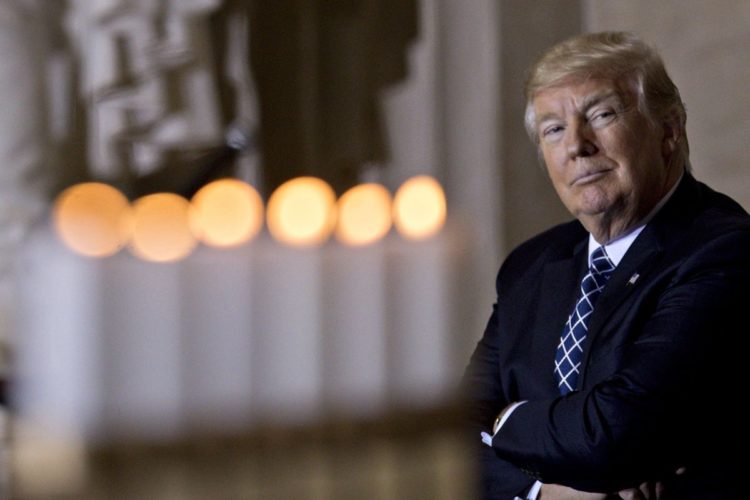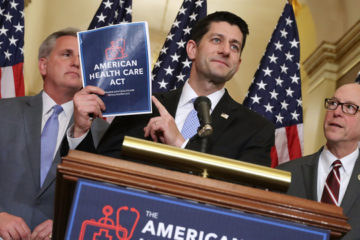Trump Vows Changes to Tax Plan in Weeks, Brushes Off Corker Feud

published Oct 10, 2017, 4:01:41 PM, by Justin Sink
(Bloomberg) —
President Donald Trump said Tuesday he plans to make changes to his tax plan within the next few weeks, while dismissing concerns that his public spat with Senator Bob Corker would scuttle an overhaul.
“We’ll be adjusting a little bit over the next few weeks to make it even stronger, but I will tell you it’s become very, very popular,” Trump told reporters in the Oval Office.
Trump didn’t specify what kind of changes he expects to make to the plan. The framework that Trump and GOP congressional leaders released last month has been criticized for adding to the budget deficit, and independent analysts suggest that it would raise taxes for 30 percent of people making between $50,000 and $150,000 per year.
The White House had no changes to announce Tuesday, Press Secretary Sarah Huckabee Sanders said later. After the Sept. 27 plan was released, White House advisers said it was up to the tax-writing committees in the House and Senate to fill in the details.
“Our priorities remain the same, but the final piece of legislation hasn’t been finalized,” Sanders told reporters. She added: “The framework is still the same.”
House Ways and Means Chairman Kevin Brady told reporters that lawmakers and the administration are constantly making adjustments to their plans for a tax bill. “Every day as we’ve looked at these ideas and solutions,” lawmakers have found ways to improve the plan, he said. He added: “All this is complicated.”
Bill ‘Very Soon’
Brady, a Texas Republican, said his committee will release a tax bill “very soon” after both chambers of Congress adopt a budget resolution this month. “The sooner the budget is done, the better,” he said. The Senate is expected to vote on its budget resolution next week. Differences between the Senate version and an earlier resolution that passed the House will have to be reconciled.
“We’re working with Congress as they put meat on the bones of the framework we jointly released,” Natalie Strom, a White House spokeswoman, said. “As the President noted, the policies outlined in the framework are very popular with the American people, and we’re working to keep it that way.”
Republicans have only a narrow majority in the Senate, and Trump’s decision to go on the attack against Corker sparked immediate concern among supporters of the tax overhaul effort that the president’s insults also could alienate other key lawmakers. He’s previously lashed out publicly at Senate Majority Leader Mitch McConnell and Arizona Senator John McCain. Trump has called Corker a “negative voice” standing in the way of his agenda.
When asked at the beginning of a meeting with Henry Kissinger whether the spat could undermine tax efforts, Trump said: “I don’t think so. I think we’re well on the way.”
‘Major Reductions’
“People want to see tax cuts,” Trump said. “They want to see major reductions in their taxes and they want to see tax reform. And that’s what we’re doing.”
Trump also said on Twitter that Corker had begged for an endorsement and decided to retire when Trump refused.
Corker’s office denied that conversation occurred, and he punched back on Twitter, saying the White House had become “an adult day care center. Someone obviously missed their shift this morning.” In a subsequent New York Times interview, he declined to say whether he believed Trump was fit for office and suggested the president could drive the U.S. into a third world war.
The Tennessee senator has said if the tax legislation adds even a penny to the deficit “there is no way in hell I’m voting for it” — though he’s willing to consider growth that might result from tax changes in considering the deficit question.
Trump continued needling Corker on Tuesday, saying on Twitter that the senator sounded like a “fool” when audio of the exchange was released by the newspaper. He referred to Corker, who is 65 and has served more than a decade in the Senate, as “Liddle’ Bob Corker,” reprising his use of derisive nicknames for foes.
State Tax Deduction
The framework released last month would cut the corporate tax rate to 20 percent from 35 percent. Pass-through business income, such as that earned by partnerships and limited liability companies, would be taxed at a top rate of 25 percent, down from 39.6 percent.
The plan would also condense the existing seven individual income tax brackets to three and cut the top individual rate to 35 percent from 39.6 percent. But Congress would have the option to create a fourth tax bracket at a higher rate for top earners.
The plan suggests eliminating the state and local tax deduction, a move that’s facing headwinds from some Republican lawmakers whose constituents are heavy users of the break. White House economic adviser Gary Cohn has said that Trump is open to negotiation on preserving the deduction.
Many details remain unclear — including where the income thresholds for the new brackets would be set. Nonetheless, relying on details from a previous House Republican plan, independent analyses have found that the framework might mean a tax increase for some middle-income taxpayers and would provide disproportionate benefits for top earners and the wealthy.
Republican leaders have heaped criticism on those analyses; House Ways and Means Chairman Kevin Brady called one of them “a work of fiction that Stephen King would’ve been proud of.”
The Sept. 27 framework also calls for subjecting companies with accumulated offshore profits to a one-time tax on those earnings — at unspecified rates. Under current law, companies can defer paying U.S. tax on their offshore earnings until they bring them to the U.S. As a result, U.S. firms have stockpiled an estimated $2.6 trillion in profit offshore. The president has said repeatedly he believes the amount is far higher.
“We’re also bringing back $3 trillion from offshore,” Trump said Tuesday. “That’s money that’s been there for years, that wants to come back into the country but the tax situation didn’t allow it to happen — and the bureaucracy.”
-With assistance from Jennifer Jacobs and Sahil Kapur.To contact the reporter on this story: Justin Sink in Washington at jsink1@bloomberg.net To contact the editors responsible for this story: Alex Wayne at awayne3@bloomberg.net John Voskuhl, Alexis Leondis
COPYRIGHT© 2017 Bloomberg L.P





No Comment